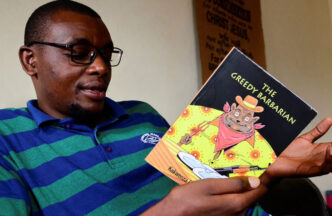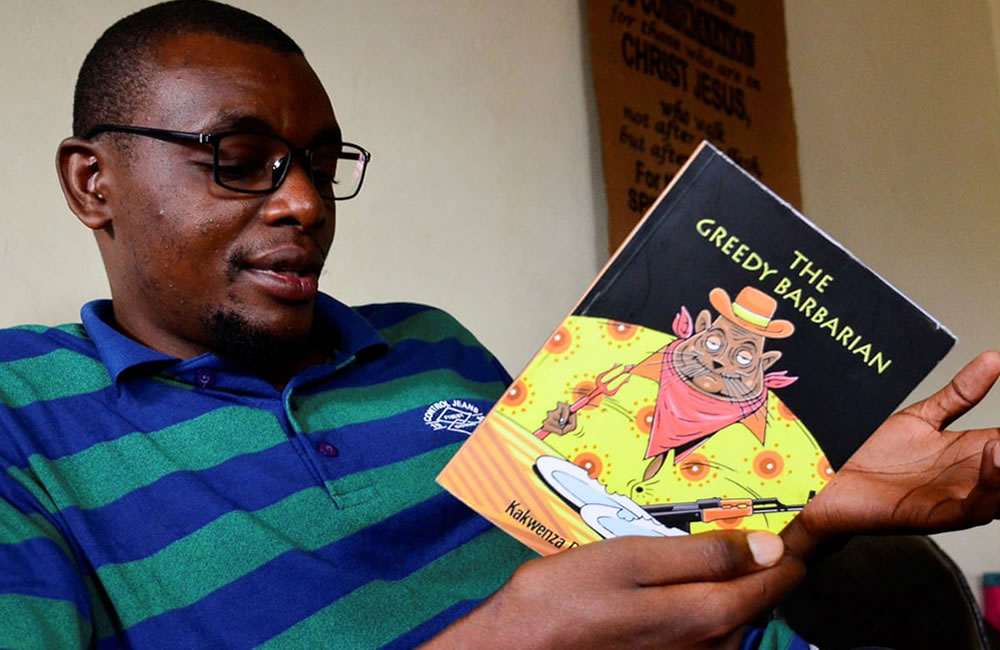Kayibanda is a miscreant personified. He is born without moral scruples. And no father. But with an enviable ability to invent such putrid mischief and greed that even the writer appears at a loss to narrate.
The Greedy Barbarian, a fictitious novel, leaves readers hanging on a plot so many a time that one would only begin to appreciate how confusing it must have been to build the character of Kayibanda when he abandons all pretenses at decency and gallops down the abyss of greed.
Except that Kayibanda has no character to begin with. If there is a time a reader has to see a character in a novel as a personification, it is in Kayibanda. He is something non-human – and the writer serves as much in portraying him as never contented with just having guns to maim and kill so he seeks mythical powers to transform into snakes, stones, grass… anything, at his convenience.
Kayibanda arrives in a fictitious Kalenga country from across the borders strapped on the back of his badly maimed mother, Bekunda. They have used porous border points, Bekunda fleeing an ugly fate that has robbed her of enviable beauty to leave her without a limb, an ear, and several teeth.
Mother and her 6-year-old son have passed out from fatigue and hunger inside Kalenga territory when a herdsman spots them. Kagurutsi is a nomadic loner with a heart so big and warm he could have mended Satan. But not Kayibanda. This is a child born with dry twigs for bones and veins.
Back in Muhemba country, Kayibanda lived unencumbered freedom with an absentee mother whose daytime was spent sleeping to compensate for the nights she lined up the streets to make a living from her body.
When he arrives in Kalenga, that freedom is no more. He quickly blends his grandfather Rukundakanuzire’s spirits, his rapist father’s evils, and his adopted father Kagurutsi’s wizardry into an art of subterfuge.
It takes Kagurutsi to turn into a snake and trail the vagabond child into the night to witness the true face of the son he had always defended before the many complainants who demanded reparation for his misdeeds.
With his patience defeated after rescuing Kayibanda from punishment by drowning meted out by neighbours, Kagurutsi exiles him from Malanga to live with a friend, Chief Bamwine, in Biguri.
The boy who pleaded for his life and vowed to mend his ways arrives in Bamwine’s homestead with an even thicker veil of deception. The humility he wears would convince angels manning the gates to heaven. But Bamwine has seen him steal chicken, milk and engage in all sorts of evil in the family.
He is sent to boarding school where he torments students and teachers into submission.
“Kayibanda was vulgar and harsh toward those who disagreed with his views, a cantankerous demeanor that would haunt him throughout his life and made people fear to oppose or correct him,” Kakwenza describes his character.
The rascal’s luck runs out when he is caught cavorting with Kamagoba in the library. The two are expelled from school. They elope.
He is to become a father soon so will Kayibanda mend his ways? It’s actually the beginning of the real monster as Kayibanda joins crime preventers and reins terror on Biguri populace. Chief Bamwine is not spared his brutality, especially during parliamentary elections.
In a rotten system that rewards notoriety, Kayibanda gets a shot at redemption with a scholarship to a university at a neighboring country. But he just has no head for the Economics course, though he has one sharp enough to plan the perfect murder of the mother of his son. Kayibanda kills Kamagoba to free space for his childhood lover, Kembaga.
Years earlier, Kagurutsi had saved Kayibanda from drowning but it is an unlikely military dictator who frees him from jail, enlists him as a hitman to eliminate political enemies.
This gives the worms in his head wings to fly beyond the abyss of greed as the book dramatically takes up political undertones when Kayibanda wrestles state control to legalise his limitless and barbaric greed.
Most literary scholars would argue against such a character as a ‘protagonist within an antagonist’ but in Kayibanda’s free radical nature, Kakwenza successfully reflects a society deprived of values by the fate of one man. Here is Kayibanda galloping head-fast against himself and the society at large. And there is no one to stop him. Just himself. And his greed.
The greedy barbarian grabs anything he fancies, tortures anyone who stands up to him and kills to console his limitless depravity. This is a man the writer builds with mock ease and punctuates with spellbinding mythical practices and the occult, forcing ribald imaginations of reality. And it’s no mean task throughout the 130-page novel as one skims through to see if Kayibanda will mend his ways or be stopped.
Praise to Kakwenza, who went missing last week with his family and lawyer Eron Kiiza, of Kiiza and Mugisha Advocates, saying he had been picked up by security over this bold book.
The Greedy Barbarian is politically bold, socially sarcastic, and literarily a bang. It’s a socio-politically mirror-sque story written with such free will that it leaves a reader wondering what would follow limitless greed such as of Kayibanda. For the answer, the writer gambles.
KAKWENZA AT A GLANCE
Name: Kakwenza Rukirabashaija
Born: November 1, 1988
Place: Kebusoni, Rukungiri District
Education: Trained journalist, student of Law at Cavendish University
Vocation: Farmer, executive director at Kakwenza Education Foundation
Author; The Greedy Barbarian, Log Cabin and the Banana Republic where writing is treasonous.



